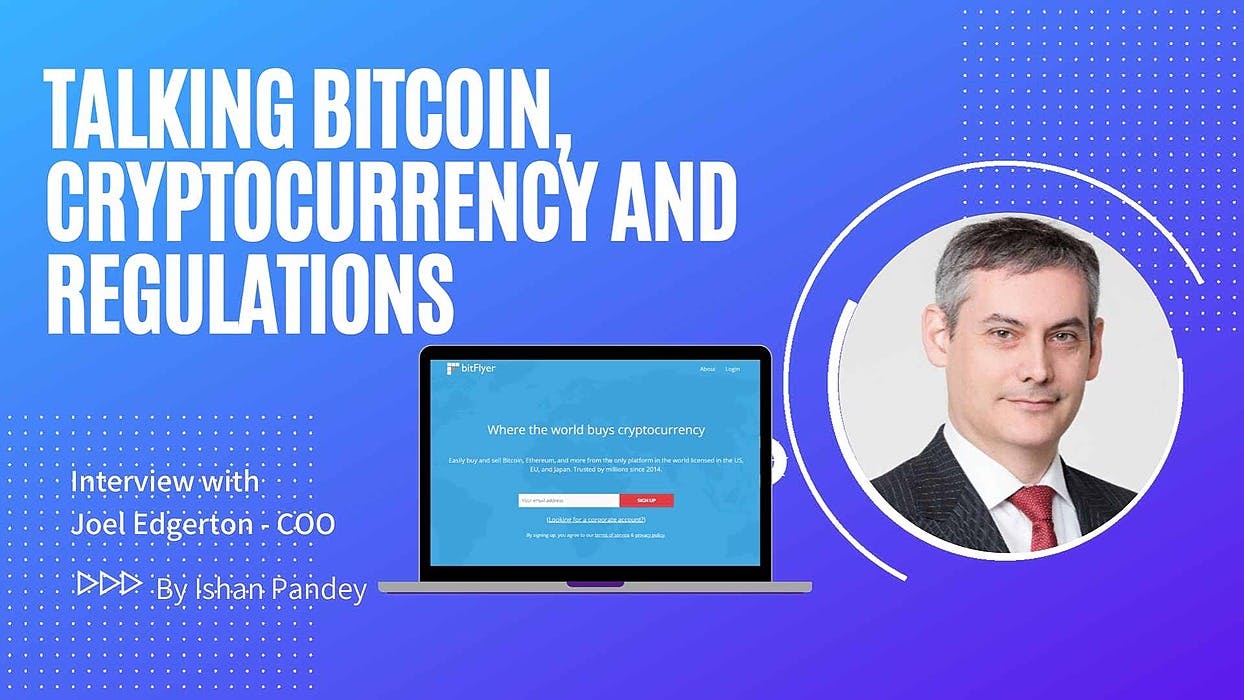visit
49 Stories To Learn About Interview Transcript by@learn
Let's learn about Interview Transcript via these 49 free stories. They are ordered by most time reading created on HackerNoon. Visit the to find the most read stories about any technology.
1. Founder's Interview: Gauthier Bros of Atayen Inc
Recently, in an exclusive interview with Gauthier Bros, the CEO and founder of Atayen Inc, where they developed an online advertising using the blockchain technology, shared his journey on how he builds Atayen Inc.
2. Building A Novel on-chain Data Storage System: An Interview with Norbert Goffa
Norbert Goffa is the Co-Founder and Executive Manager of ILCoin Blockchain Project, whose mission is to prepare blockchain technology for mass adoption and create the first fully scalable on-chain data storage solution.
3. Startup Interview With Mitja Goroshevsky - Co-Founder and CTO of TON Labs
Mitja Goroshevsky, the Co-Founder and CTO of TON Labs, where I focus on developing core technical infrastructure for Free TON
4. Digital Assets Have Outperformed a Majority of Asset Classes - Marco Mottana
A study by the Cambridge Center for Alternative Finance recently revealed that there are over 100 million crypto participants worldwide. This revelation is indicative of the crypto market’s growing attractiveness to investors interested in taking advantage of the inflation hedging capacity of Bitcoin and the profitability of DeFi tokens. The digital asset market has established itself as one of the best performing asset classes in 2020. And for this reason, I expect more investors to flock into the space.
5. dApp Development With Michael Vandeberg: An Interview
Blockchain engineer explains how to build decentralized applications (dApp)
6. "South Koreans were early adopters, with 1 in 3 workers buying Bitcoin" - Ronald Chan
Ronald Chan is the CEO of ProBit Exchange Global, a global digital currency trading platform with strong roots in South Korea, that provides a seamless experience for institutional and individual traders. Ronald joins us today to discuss the current crypto scene in South Korea and his personal viewpoints regarding the blockchain market on an international scale
7. Tokenized Real Estate: A $17 Trillion Opportunity
The following article is part of our Masters of Blockchain story series. Each piece in the series breaks down a chapter from the popular Masters of Blockchain, written by Andrew Romans.
8. Leader's Speak : Joel Reymont, Lead Developer @ Stegos [Interview]
I returned with a newfound conviction that I was exactly where I needed to be, and simply needed to define the values I am passionate to pursue. I grew up in the Soviet Union. While I am now removed from the days of government surveilling my every word and action, I've found that culture of surveillance replicated everywhere online.
9. "All DeFi Applications Are Shooting For The Sky But no One is Wearing a Parachute" - Allan Henders
There is a lot to take away from the price performance of the digital asset market in 2020. One of such is that the concept of bitcoin halving, as expected, is a major contributing factor to the success of the bitcoin market and has eventually delivered the level of price swings projected during the pre-halving days. Another is that DeFi is perhaps the most potent application of cryptocurrency technology, which makes it the most plausible instigator of the next wave of growth. In the months following the global market crash, the DeFi landscape has attracted around $14 billion worth of capital. Why is this so?
10. "In the US, Customer is King. In Japan, Customer is God": An Interview with Joel Edgerton
It is fun to speculate on the price of Bitcoin or whatever your favorite asset is, but the real question for our industry is what value are we delivering to our customers. How are we making their lives better, saving them time or money? If a crypto exchange needs a major bull run in Bitcoin to survive, then they have the wrong business model.
11. Tokenization is the way to achieve Transperency & Data Security in Asset Management - Oleg Kurchenko
Today's guest on Mondays with Entrepreneurs, firmly believes that the key to success is implementing new things with enthusiasm.
12. Interview With Francesco Vivoli About Crypto Lending And DeFi
Crypto’s growing attractiveness stems from digital assets’ unique capacity to eliminate pain-points peculiar to certain industries. Without any doubt, one of the defining successes of crypto in 2019 is the emergence of DeFi technology, especially in the lending and investment market. Together, cryptocurrency and its underlying technology enable lending ecosystems devoid of challenges prevalent in legacy systems. With this setup, lenders can easily invest in the budding crypto lending market, while borrowers can evade the bureaucratic structure of traditional lending facilities and enjoy lesser interest rates.
13. Top Transcription APIs and Open Source Libraries in 2022
This article looks at some of the top transcription APIs and open source libraries available on the market today.
14. "Cryptocurrency is Becoming so Widespread, That it is Better Not to Shy Away From it" - Andreas Berg
With cryptocurrency becoming a new investor frenzy on the face of a rapidly inflating global economy, it once again proves the importance of alternative investment instruments in the times of a crisis.
15. Anything Built on Top of Legacy Architecture is at Risk — Unhashed #4
Benjamin Diggles, the co-founder and CRO of Constellation Network explains how Constellation Network is working to improve the current scenario
16. An Interview with John Speigner: Decentralisation Implies Inherent Security
I had the opportunity of interviewing Coin.Space’s CEO and founder, John Speigner. During the interview session, Jonathan discussed the challenges of leading the charge in the crypto security sector, among other things. Jonathan Speigner, has built Coin Wallet from the ground up and immensely contributed to the crypto mainstream narrative at large. Below is an excerpt from the enlightening conversation I had with the security expert.
17. "Bitcoin Will Perform Well, Just Like Gold" says Thor Chan, A CEO of a Crypto Exchange
Thor Chan, the CEO of AAX crypto exchange. They recently announced their affiliation with the LSEG, also known as London Stock Exchange Group. The cryptocurrency market is very unpredictable and often we doubt its functioning and security. Let us try to understand this fluctuating market from one of the industry leaders and see how his company is changing the preconceived notion surrounding the above-said market.
18. Disrupting and Decentralizing Lending - Dan Schatt [Interview]
Hi Dan Schatt, welcome to our series “Behind the Startup” tell us about your journey from the payments industry to decentralized finance (DeFi)?
My “Aha” moment was in 2013 at PayPal. We called ourselves “The Internet of Payments” and had spent so much time plugging into traditional payment and settlement systems around the world, eliminating buyer and seller frictions, as long as they all used PayPal. Moving bits of data is easy when everyone is using the same database. I thought to myself, I don’t know if it’s 10 years or 20 years, but when distributed ledger technology scales, they will eventually overtake traditional payment networks. We started thinking about what infrastructure would be needed to spur the development of financial services for the “token economy” and that’s eventually how CRED was born!19. "Decentralized Protocols Disintermediate Misaligned Agencies" - Melanie Mohr [Interview]
The Decentralized economy based on permissionless protocols is swiftly growing as more people in the world embrace the idea of P2P ecosystems.
20. "Blockchain Technologies Provide a Solution For Almost Every industry" - Charles Allen
There are several narratives identified as the propelling factors for the increasing demand for crypto assets. However, the most potent is the “store of value” narrative that has established crypto, most especially bitcoin, as the go-to-asset for investors looking to hedge against inflation. This sentiment trails what experts term as a critical period in human history borne by an unrelenting health crisis and a myriad of flawed economic policies designed to suppress its impact. According to a report by the Economic Policy Institute, over 17 million Americans will permanently lose their jobs because of the coronavirus pandemic.
21. "Connect, Analyze and Learn from Data" - Dr. Yu Xu
Welcome to "Mondays with Entrepreneurs". This week we have with us an Entrepreneur and tech expert who thinks Monday is the most exciting day of the week.
22. "Bitcoin Mining Ban in China is Leading to Hash Rate Decentralization" - Matt Hawkins
Bitcoin mining, its impact on the environment, and why China's mining ban is good for Bitcoin.
23. Leader's Speak : Chris Schneider, CMO of Sky.io [Interview]
This week have with us Chris Schneider, CMO of Sky.io, a newly launch crypto asset trading platform based out of Singapore. Chris joins me today to discuss the current crypto scene in Singapore and his personal viewpoints regarding the blockchain market on an international scale
24. Volatility is the Most Exciting and Frustrating Part of Crypto — Unhashed 2
We want cryptocurrencies to be regulated but fairly.
25. Are provably fair games going to be the next big thing in the online gambling industry? [Interview]
“I have a dream” that one day all forms of online gambling will be possible on the blockchain and users won’t need casinos or anyone else to withdraw, deposit and bet/win.
26. "The Single Biggest Driving Factor for Robinhood was Democratizing Investing" - Atif Yaqub
Taking the world by storm this year, DeFi will forever remain imprinted on 2020’s surface.
27. "Any Industrial Revolutions Must Come With a Technology Transformation" - The Professor
The way people wager is changing rapidly, thanks to advancements in technology. Gamblers are continually being introduced to new ways of gambling, and betting companies are locked in this fierce battle of trying to stay ahead of the curve.
28. "DeFi Continues to Innovate And Grow Despite The Economic Downturn" - Jonathan Edward
Since its origin quite long ago, asset management has been considered a smooth way to effortlessly kick your financial portfolio into gear using a professional’s help. To get it done, people prefer to hire professionals who possess a strong level of financial sensibility and constantly keep their hands on the pulse of the market. Whether you are driven by their competence or your own lack of free time, financial professionals can do all the grunt work for you and in the best cases, end up with returns which exceed initial expectations.
29. "DeFi Will Look at Traditional Finance From Above" - Sean Qian
Following the devastating effect of the pandemic, the world has quickly realized that it has to adapt to the new fickle environment – otherwise it will not withstand the hardship of Covid-19.
30. "We Don't Expect Software to Work Any Longer": A Non-trivial Interview with Natallia Shauchenka
To kick off this interview, can you tell us what companies you have worked for?
31. Bypass Typing To Transfer Your Thoughts Directly To Computer [Interview]
In this interview with Ivo de la Rive Box, co-founder and CEO of MindAffect we explore the advances in Brain Computer Interfaces (BCI) and how it can be used to allow locked-in patients to interact with their surroundings and communicate with their loved ones.
32. Decentralizing Financial Instruments with Programming: Interviewing Boris Povod of Dfinance
We want to become the Robinhood of financial products, letting any regular person to experiment with our protocol or try to find profitable opportunities. One of the use cases would be a financial platform-oriented at mainstream users, that we are going to launch on top of dfinance.
33. [Interview] Decentralization and Privacy in Telecommunications
ENCRY is a multi-disciplined international holding company specializing in the creation of high-tech products in the telecommunications field, as well as decentralized and distributed services. We talked with ENCRY’s founder Roman Nekrasov and the technical director Andrei Chmora about the implication of blockchain in the telecom industry and how ENCRY’s developments can drastically improve the security of users on the Internet.
34. "DeFi is One of The Most Progressive And Enticing Industries to Date" - Katherine Deng
During the three years of DeFi's existence, this year it rematerialized stronger than ever before. Many other platforms aim to reach the gates of DeFi with exuberant yield farming projects in progress, thus revolutionizing traditional users' operations and introducing other comforts into daily life.
35. "If Bitcoin Becomes Compliant Tomorrow, All Reservations Against It Will Disappear" - Max Krupyshev
With cryptocurrency reaching a fever peak as to even get accepted for tax payments, Bitcoin and other digital currencies gain traction in both public and private spheres.
36. "Gaming Experience Would Shift to Economic Earning Value" - Oladapo Ajayi
Blockchain provides a wide variety of channels to create or recreate new models for legacy systems. The components of this technology offer disruptive frameworks that can optimize the way we execute transactions and much more. And although financial applications remain the most compelling use case of blockchain, it has registered a similar level of success in the gaming industry. The introduction of CryptoKitties in 2017 showcased just how versatile blockchain is and the enormous demand for blockchain-enabled gaming platforms.
37. OKEx CEO Thinks That China's Digital Currency DCEP Could Be A Gamechanger For Crypto And Finance
I sat down with Mr. Hao to talk about his background, his work at OKEx, the Coronavirus pandemic and its effects on major global economies, as well as the crypto markets. Recently, China revealed a test interface of their CBDC (Central Bank Digital Currency) , Mr.Hao also shares his opinions about this big news.
38. Interview With Bryan Seiler on Greedy Banks, turning $150 Into Millions and More
Every crypto practitioner has a unique narrative that has brought him or her face-to-face with the realities of the true innovative power of crypto technology. Perhaps, this notion is the reason why the crypto community has stood by the viability of cryptocurrency all through its trying times. As such, the crypto space has evolved into a network of mavericks who are not only tech-savvy but have learned to appreciate and nurture the business side of the crypto economy.
39. Building Scalable Blockchain Solutions To Support Dapps of Tomorrow - An Interview
Lower transaction fees and settlement time is crucial for the success of any decentralized application, and for that, you need to have a scalable blockchain framework
40. "We, The Crypto Community Are Excited About The Coming Months" - Vladimir Nosov
The crypto industry is currently in a critical growth phase fueled by the influx of institutional traders and intensified engagement with crypto assets. This budding crypto era, connoted by the price rally of digital assets and the explosion of DeFI protocols, coincides with a period of increased uncertainty in a majority of traditional markets. Experts believe that the unbridled spending of governments in the guise of economic relief programs could lead to a catastrophic end. As such, institutional investors are increasingly opting for cryptocurrencies and precious metals to hedge against inflation. According to a report by Fidelity Investments, 36% of the 774 institutional investors surveyed across Europe and America own cryptocurrencies or its derivatives.
41. "It's Only Fair That Users Retain Ownership Of Their Personal Data & Generate Value" -Sheridan Johns
With just over 4,000 data brokers controlling the loosely regulated data economy, there are absolutely no guarantees when it comes to data protection, privacy, and ownership.
42. Blockchain Helped My Business by Solving Our Trust Issues [Interview]
Every year, cryptocurrencies are increasingly entering the life of a modern person. Today they are used to solve financial problems in many areas - this is purchases, this is investment, trading, this is the solution of financial issues at the state level.The transparent decentralized data registry on which cryptocurrencies are built has not bypassed the gambling industry either.
43. "The Idea Behind Digital Сurrencies is to Reduce Total Control Over Money Markets" - Dmitry Filyaev
The crypto market has evolved significantly since Bitcoin’s whitepaper was conceived 12 years ago, shortly after the U.S Financial Crisis which devastated the global economy. Today, this space enjoys a cool $400 billion in market capitalization with Bitcoin taking the lion share at a 62.4% dominance. Unlike like in the past where Bitcoin was the main narrative, dynamics are now shifting as crypto innovators pivot towards decentralized products and ecosystems.
44. "Rust Isn’t Afraid to be Imperfect as Long as we Ship something Useful" - Steve Klabnik
Steve Klabnik is a member of the Rust core team, an active open-source contributor, and author of The Rust Programming Language, Rails 4 in Action, and Designing Hypermedia APIs books. In 2012 and 2016, we invited Steve to speak at the RailsClub (now RubyRussia) conference. Since then, Steve has been working on Rust a lot, did a lot of interesting things and we realized that we should definitely interview him once again!
45. "Crypto is going to change the world" - Daniel Gouldman
Central bank digital currencies are the future of money. This is the way.
46. "I Believe That Crypto Will Eventually Replace Current Monetary Infrastructures" - Yuri Nesterov
During the chaos caused by the global pandemic, P2P, or peer-to-peer, transformed into a growing worldwide movement can no longer be left in shadow. Some experts even regard it as a way to save the global economy from an all-embracive post-pandemic crash. P2P already proved to be advantageous against a traditional exchange model in a number of ways – not least because it allows higher inclusion and can freely function even in countries that do not define cryptocurrency under their jurisdictions. Take an example of India – it is about to embark on the biggest bull rally of all time, and P2P exchanges are the engine behind it. Besides, P2P may be a lifeline for SMEs hit by the economic crash most severely – in conditions where they do not qualify for the bank credit support, P2P may become the only way to bail out.
47. "Centralized service providers theoretically can end their products" - Masato Kakamu
The sheer number of professionals and artisans opting for more flexible working and sharing models aided by significant advancements in communication and transaction-based technologies have surged in recent years.
48. An Encryption Deep Dive - Part Two
Chris Hickman and Jon Christensen of Kelsus and Rich Staats of Secret Stache continue their series on encryption to discuss transport layer security (TLS) in practice.
49. The Twelve-Factor App: 12 Best Practices For Microservices
Summary
Thank you for checking out the 49 most read stories about Interview Transcript on HackerNoon.
to find the most read stories about any technology.L O A D I N G
. . . comments & more!
. . . comments & more!





























































